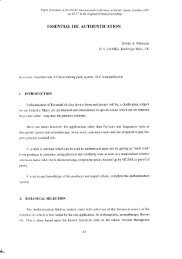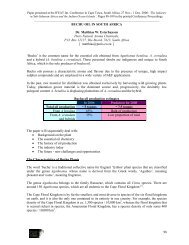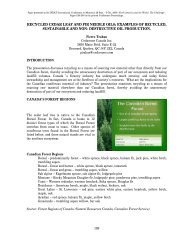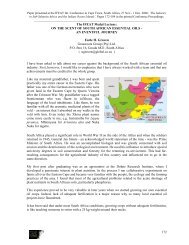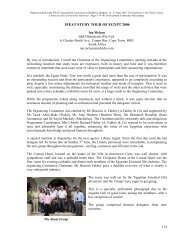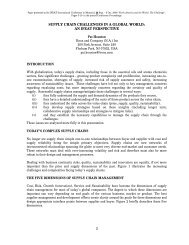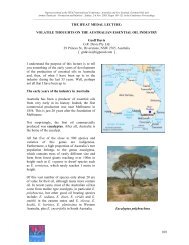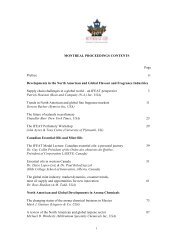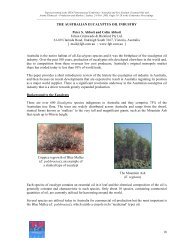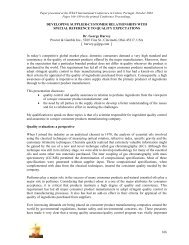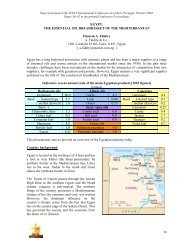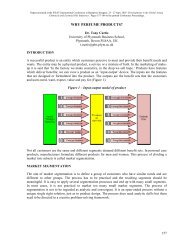HUNGARY'S ESSENTIAL OIL INDUSTRY Csaba Fodor ... - IFEAT
HUNGARY'S ESSENTIAL OIL INDUSTRY Csaba Fodor ... - IFEAT
HUNGARY'S ESSENTIAL OIL INDUSTRY Csaba Fodor ... - IFEAT
Create successful ePaper yourself
Turn your PDF publications into a flip-book with our unique Google optimized e-Paper software.
Or, what can you do if one of your major customers is merging with another multinational, and your<br />
product is simply eliminated from the raw material list Shall we be worried again, listening to the<br />
news<br />
Legislation: I shall refrain from going into details, as there are a number of lectures during the<br />
conference dedicated to this subject. However, what can a distiller do if his customer is forced to<br />
eliminate his oil from the formula Unfortunately, several essential oils now should be considered as<br />
endangered species in the EU. Even in Hungary we have a local problem and our association is trying<br />
to fight a clever clerk in the Environmental Ministry who put a phrase into our law on Hazardous<br />
products two years ago. This regulation states that all waste material from aromatic herb processing<br />
must to be considered as hazardous material, unless otherwise proven by some very expensive tests.<br />
Now all exhausted residues of chamomile, dill, caraway, etc., formerly considered as valuable byproducts<br />
(natural fertilizers), are targets for our local agencies. It is a really crazy world.<br />
Other specific Hungarian problems include:<br />
• The strengthening of our currency (the Forint) by more than 15 % this year. This is quite a<br />
challenge considering the fact that more than 95% of the Hungarian essential oil production is<br />
exported. We have to compensate it with increased productivity, cost reductions, etc. which is<br />
not an easy job.<br />
• The lack of experienced farmers with large landholdings and cultivation equipment.<br />
• The cost of manpower is increasing sharply.<br />
Our answer to these challenges are:<br />
We will strive to develop better and better species. Sometimes the result of research is an existing<br />
crop with higher yield (as in case of fennel), or with higher contents of active ingredient (as in the case<br />
of blue chamomile with more that 10% chamazulene). Sometimes, we reintroduce traditional species,<br />
abandoned earlier due to heavy competition. Examples of this group are: lavender, coriander, tarragon,<br />
and peppermint; all were big Hungarian products in the past, are small today but any of them might be<br />
a key product tomorrow. Also, we must examine native flora that has previously never been distilled<br />
on a commercial scale; the most recent example of this work is origanum. Other research in these<br />
areas has given promising results.<br />
Reorganization of the raw material supply: To persuade and then teach farmers to grow an<br />
unknown aromatic herb is a difficult and sometimes hopeless job. They always compare the<br />
profitability with very different types of crops. Unless they see a large potential margin, they stay with<br />
their well-known annual crops, such as wheat and corn. Also, those who are already growing aromatic<br />
herbs tend to quit rather quickly at crop failure. They do not plan for long term. If you want stability<br />
you have to put some control on your raw material supply. For these reasons, Silvestris created a<br />
subsidiary to grow aromatic herb exclusively for its essential oil production in 2000. This proved to be<br />
successful in the first two years.<br />
Reorganization of production system: Eliminating manpower whenever possible, by using<br />
mechanisation in both agricultural and distillation operations. A new distillery is being established<br />
right on the field to reduce transportation costs.<br />
In summary, I think that the general trend in our industry is for shorter product lives, thus the time to<br />
adjust to market challenges all through the supply chain is becoming shorter and shorter. Those closely<br />
48



